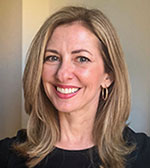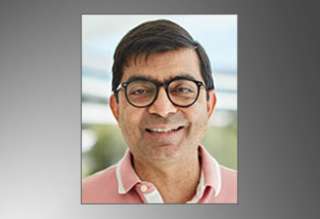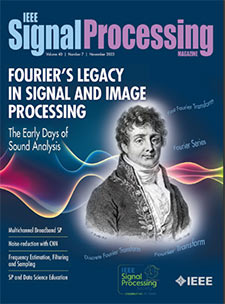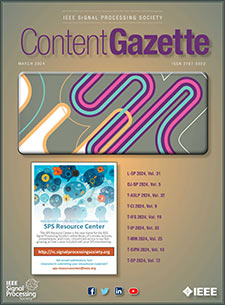- Our Story
- Publications & Resources
- Publications & Resources
- Publications
- IEEE Signal Processing Magazine
- IEEE Journal of Selected Topics in Signal Processing
- IEEE Signal Processing Letters
- IEEE/ACM Transactions on Audio Speech and Language Processing
- IEEE Transactions on Computational Imaging
- IEEE Transactions on Image Processing
- IEEE Transactions on Information Forensics and Security
- IEEE Transactions on Multimedia
- IEEE Transactions on Signal and Information Processing over Networks
- IEEE Transactions on Signal Processing
- IEEE TCI
- IEEE TSIPN
- Data & Challenges
- Submit Manuscript
- Guidelines
- Information for Authors
- Special Issue Deadlines
- Overview Articles
- Top Accessed Articles
- SPS Newsletter
- SigPort
- SPS Resource Center
- Publications Feedback
- Publications FAQ
- Blog
- News
- Dataset Papers
- Conferences & Events
- Community & Involvement
- Professional Development
- For Volunteers
- Information for Authors-OJSP
-
Home
Conferences14 April 2025 to 17 April 2025Conferences Events IEEE JSTSP Article IEEE Signal Processing Magazine IEEE TIFS Article IEEE TMM Article IEEE TSP Article Jobs in Signal Processing Lectures Machine Learning Seasonal Schools Signal Processing News SPM Article SPS Distinguished Lectures SPS Newsletter Article SPS Webinar SPS Webinars SPS Webinar Series Webinar webinars
-
Our Story
What is Signal Processing?

The technology we use, and even rely on, in our everyday lives –computers, radios, video, cell phones – is enabled by signal processing. Learn More » -
Publications & Resources
-
SPS Resources
- Signal Processing Magazine The premier publication of the society.
- SPS Newsletter Monthly updates in Signal Processing
- SPS Resource Center Online library of tutorials, lectures, and presentations.
- SigPort Online repository for reports, papers, and more.
- SPS Feed The latest news, events, and more from the world of Signal Processing.
-
SPS Resources
-
Conferences & Events
-
Community & Involvement
-
Membership
- Join SPS The IEEE Signal Processing Magazine, Conference, Discounts, Awards, Collaborations, and more!
- Chapter Locator Find your local chapter and connect with fellow industry professionals, academics and students
- Women in Signal Processing Networking and engagement opportunities for women across signal processing disciplines
- Students Scholarships, conference discounts, travel grants, SP Cup, VIP Cup, 5-MICC
- Young Professionals Career development opportunities, networking
- Get Involved
-
Technical Committees
- Applied Signal Processing Systems
- Audio and Acoustic Signal Processing
- Bio Imaging and Signal Processing
- Computational Imaging
- Image Video and Multidimensional Signal Processing
- Information Forensics and Security
- Machine Learning for Signal Processing
- Multimedia Signal Processing
- Sensor Array and Multichannel
- Signal Processing for Communication and Networking
- Signal Processing Theory and Methods
- Speech and Language Processing
- Technical Working Groups
- More TC Resources
-
Membership
-
Professional Development
-
Professional Development
- Mentoring Experiences for Underrepresented Young Researchers (ME-UYR)
- Micro Mentoring Experience Program (MiME)
- Distinguished Lecturer Program
- Distinguished Lecturers
- Distinguished Lecturer Nominations
- Past Lecturers
- Distinguished Industry Speaker Program
- Distinguished Industry Speakers
- Distinguished Industry Speaker Nominations
- Industry Resources
- IEEE Training Materials
- Jobs in Signal Processing: IEEE Job Site
-
Career Resources
- SPS Education Program Educational content in signal processing and related fields.
- Distinguished Lecturer Program Chapters have access to educators and authors in the fields of Signal Processing
- PROGRESS Initiative Promoting diversity in the field of signal processing.
- Job Opportunities Signal Processing and Technical Committee specific job opportunities
- Job Submission Form Employers may submit opportunities in the area of Signal Processing.
-
Professional Development
-
For Volunteers
-
For Board & Committee Members
- Board Agenda/Minutes* Agendas, minutes and supporting documentation for Board and Committee Members
- SPS Directory* Directory of volunteers, society and division directory for Board and Committee Members.
- Membership Development Reports* Insight into the Society’s month-over-month and year-over-year growths and declines for Board and Committee Members
-
For Board & Committee Members
Popular Pages
Today's:
- Submit a Manuscript
- Information for Authors
- (MLSP 2024) 2024 IEEE International Workshop on Machine Learning for Signal Processing
- SPS Scholarship Program
- IEEE/ACM Transactions on Audio Speech and Language Processing
- (SLT 2024) 2024 IEEE Spoken Language Technology Workshop
- IEEE Transactions on Image Processing
- IEEE Transactions on Multimedia
- IEEE Signal Processing Letters
- Information for Authors-SPL
- (ACSSC 2024) 2024 Asilomar Conference on Signals, Systems, and Computers
- Conferences & Events
- IEEE Transactions on Signal Processing
- (SAM 2024) 2024 IEEE 13th Sensor Array and Multichannel Signal Processing Workshop
- Governance Documents
All time:
- Information for Authors
- Submit a Manuscript
- IEEE Transactions on Image Processing
- 404 Page
- IEEE/ACM Transactions on Audio Speech and Language Processing
- IEEE Transactions on Information Forensics and Security
- IEEE Transactions on Multimedia
- IEEE Signal Processing Letters
- IEEE Transactions on Signal Processing
- Conferences & Events
- IEEE Journal of Selected Topics in Signal Processing
- Information for Authors-SPL
- Conference Call for Papers
- Signal Processing 101
- IEEE Signal Processing Magazine
Last viewed:
- IEEE Transactions on Information Forensics and Security
- Autonomous Driving: Part 1-Sensing and Perception
- (ISBI 2024) 2024 IEEE International Symposium on Biomedical Imaging
- Information for Authors-SPM
- Theory and Applications of Digital Speech Processing (2010)
- Seasonal Schools
- (MLSP 2024) 2024 IEEE International Workshop on Machine Learning for Signal Processing
- IEEE/ACM Transactions on Audio Speech and Language Processing
- Video & Image Processing Cup
- Submit a Manuscript
- Getting to Know Your Fellow Researchers: Dilek Hakkani-Tür
- (SLT 2024) 2024 IEEE Spoken Language Technology Workshop
- IEEE Transactions on Computational Imaging
- SPCOM TC Home
- SPS BISP TC Webinar: How to Merge Deep Learning Models with Physics for Fast Multidimensional MRI
Series to Highlight Women in Signal Processing: Anna Scaglione
You are here
Newsletter Menu
Newsletter Categories
Top Reasons to Join SPS Today!
1. IEEE Signal Processing Magazine
2. Signal Processing Digital Library*
3. Inside Signal Processing Newsletter
4. SPS Resource Center
5. Career advancement & recognition
6. Discounts on conferences and publications
7. Professional networking
8. Communities for students, young professionals, and women
9. Volunteer opportunities
10. Coming soon! PDH/CEU credits
Click here to learn more.
News and Resources for Members of the IEEE Signal Processing Society
Series to Highlight Women in Signal Processing: Anna Scaglione
 Anna Scaglione (F) (M.Sc.'95, Ph.D. '99) is currently a professor in electrical and computer engineering at Arizona State University (ASU). She was Professor of Electrical Engineering previously at the University of California at Davis (2008-2014), and at Cornell University, (2001-2008). Prior to joining the engineering faculty at Cornell, Dr. Scaglione was an Assistant Professor at the University of New Mexico (2000-2001).
Anna Scaglione (F) (M.Sc.'95, Ph.D. '99) is currently a professor in electrical and computer engineering at Arizona State University (ASU). She was Professor of Electrical Engineering previously at the University of California at Davis (2008-2014), and at Cornell University, (2001-2008). Prior to joining the engineering faculty at Cornell, Dr. Scaglione was an Assistant Professor at the University of New Mexico (2000-2001).
Dr. Scaglione was elected IEEE Fellow (2011). She was Editor-in-Chief, IEEE Signal Processing Letters (2012-2013); Associate Editor, IEEE Transactions on Wireless Communications (2002 to 2005); Editorial Board Member, IEEE Transactions on Signal Processing (2008 to 2010); Area Editor, IEEE Transactions on Signal Processing (2010-2011); Senior Editor, IEEE Transactions on Control of Networked Systems; General Chair, SPAWC (2005); Member, Signal Processing for Communications and Networking Technical Committee (2004 to 2009); Steering Committee Member, IEEE SmartGridComm Conference (2010 to 2015); Member-at-Large, IEEE Signal Processing Society Board of Governors (2012-2014).
Dr. Scaglione received the IEEE Signal Processing Best Paper Award (2000); and the IEEE Donald G. Fink Prize Paper Award (2013). Her research with her students was also honored with the IEEE Signal Processing Society Young Author Best Paper Award (Lin Li) (2013), and three conference best paper awards: Ellersick Best Paper Award at MILCOM (2005), the Student Best Paper Award at Smartgridcomm (2014), and the Student Best Paper Award at ICASSP (2017). She was also a recipient of the NSF CAREER Grant (2002).
Dr. Scaglione’s expertise is in the broad area of statistical signal processing for communication, electric power systems and information and social networks. Her current research focuses on studying and enabling decentralized learning and signal processing in networked systems.
We approached her with a few questions.
Q. “Please tell us about yourself and your background.”
I was born in Reggio Calabria (Italy looks like a boot, and my town is its “toe”). Reggio is in front of the water, with perfectly tempered weather, offers a beautiful view of the Etna Volcano, peaking beyond the zephyr blue sea in the strait of Messina, and beach life that can be enjoyed for three straight months a year. Enough to forget social problems often profiled in classic American movies. In this backdrop, nine out of twelve months a year I was a quiet and studious kid, with a rebellious side that manifested itself with a spikey hair cut and with my habit for drawing cartoons.
After high school, I moved to Rome, where my brother was studying law and I started engineering. I chose it because I was intrigued by the notion of artificial intelligence, because it was hard, and because I thought it combined exact math (which I felt was full of beauty) with design, where my creative mind could find an outlet. But I was deeply confused about what kind of engineer I was (I come from a family of lawyers). I chose to become an electrical engineer rather than a computer scientist because the first course of programming was boring compared to the math courses I had to take to become an electrical engineer. Soon after I fell in love with signal processing because of Papoulis book and Oppenheim and Shafer book and the professor who taught me about random processes, who later became my Ph.D. advisor (but automatic control was a close contender!). I had no plans of pursuing a doctorate. I came to it once I realized that my desire for doing creative work could not be met by the job opportunities I had in Italy with a Master degree. So, when my advisor (Prof. Sergio Barbarossa) asked me after my Master thesis if a Ph.D. would interest me I basically said: “where do I sign?”. And that is how my research career in Signal Processing started. I visited Prof. Georgios Giannakis group when I was a Ph.D. student and that lead to really nice research, my SPS best paper award, and my appointment as a Postdoc in his group at the University of Minnesota. I later realized that I might have been the only Postdoc in the entire US who was in the area of Signal Processing for Communications at the time. This was 1999, the heyday of the Tech bubble and job opportunities for me abounded in industry and academia. My heart was set on going back to Italy. That was the plan until I fell in love with my present husband and a friend of mine, Dr. Ananthram Swami, gave me the best life advice I ever received: “Anna, it is best to look for a (permanent) job when you have a (permanent) job”. That is particularly true for academic jobs, I took his advice and looked for jobs in the US, and was able, in spite of my delays and indecisions, to land my first position at the University of New Mexico, in 2000, where my academic career was launched.
Q. “Why did you become full Professor at ASU?”
I had wonderful colleagues at the University of New Mexico, but an opportunity opened up at Cornell, just one year after I joined UNM. The offer was too good to pass, in spite of all the warmth of my colleagues and the beauty of New Mexico. In one year, I left and became an Assistant Professor at Cornell and was tenure there in 2006. But the love of my life was still in Minneapolis. My later move to UC Davis allowed me to solve my “two-body problem” – my husband was a Professor at the University of Minnesota and we were both hired at UC Davis in 2008. Then, in 2015, the move from UC Davis to ASU helped me grow my research group in energy delivery systems, an area where sensing, communications, and decision systems can make a huge difference in having resilient and sustainable infrastructures.
Q. “How does your work affect society?”
As academics our contributions are twofold: we establish what are the principles superior technologies obey and we train world-class thinkers. When I wrote my Ph.D. thesis, MIMO precoding for wireless communications had a lot of detractors. The same technologies these days are the golden standard. In the short-term society picks winners and losers accounting for many other factors, but longer terms the best technical solutions usually emerge. Timing when that happens is hard. Unless you start a company, and you start it when the time is ripe, the best impact you can hope for is that eventually, you contribute, hopefully, earlier than others, to the chorus of researchers that lead the way towards a better way of doing things. The second contributions scholars from academia make is molding new minds to think critically and create new technology. Your pupils go out into the world and can shake things up too. Right now, I feel society needs to harness data and information technology to share limited resources over congestible networks efficiently, bypassing central control. This is what I am working on now.
Q. “What challenges you had to face to get where you are today?”
Every huge change, particularly if you are uprooted from places and habits, require adaptation, which can cause stress and fear. I have faced a lot of changes in my life when I moved from Italy to the US, and in all my career moves, when I decided to learn in-depth another area beyond signal processing and communications, to best understand how they can be useful in energy infrastructures. Accepting and adapting to change requires courage. But I think courage and imagination are similar virtues (or the latter can replace the former). I certainly feel my imagination is what sustained me and made less afraid of uncertainty because I can envision what is the “sample space” of the outcomes of my possible decisions and I am curious and can see a high reward in taking high risk. Oh, and working like crazy offsets a lot of risks! And I have done that too.
Q. “What advice would you give to scientists/engineers in signal processing?”
A boring suggestion is to cultivate basic knowledge, before following trends and also to not be afraid to look beyond the problems everyone is looking at. It is fun and thrilling to define your own problems. The area of signal processing has a long tradition in modeling and mapping seemingly impossible problems in some algebraic and statistical formulation that can be beaten to death. We started from “Acoustic signals” and, while that part certainly continues to be important, the tools from signal processing are so much more widely applied.
Q. “Anything else that you would like to add?”
To my young colleagues: be brave and sensible. These two are not opposing traits. If you seek to be popular: communicate less your insecurities, be polite but set your boundaries and before you try to rescue the world on your spare time, make sure you take care of yourself, your associates and your tasks. Recognize quickly when help is not going to come your way and do not mull over regrets or spend time arguing. No matter what is your origin, race or gender, accept your weakness and vulnerabilities quietly, be honest and put in front of the world your courage, compassion, and creativity. In short, put your best step forward. These are the best things you can do to be successful.
Open Calls
Society News
- Upcoming Webinar! “Direct Localization for Massive MIMO” presented by Nil Garcia and based on an IEEE Xplore article published in IEEE Transactions on Signal Processing
- Job Opportunities in Signal Processing
- Call for Nominations: Awards Board and Nominations and Appointments Committee
- Election of President-Elect, Regional Directors-at-Large and Members-at-Large
- Upcoming Webinar and Open Access Article by Dr. Danfeng (Daphne) Yao: 18 September 2019
- Recording Available on the SPS Resource Center: Distinguished Lecture by Professor José M. F. Moura
- Call for Nominations: Fellow Evaluation Committee
Conference News
Publications News
TC News
Chapter & DL News
- Process Change for Member Driven Initiative Proposals
- Signal Processing Society Chapters' Best Practices: Chirag Paunwala
- Local Reach, Global Impact
- Redesigned OU Monthly Statistics Now Available
- OU Analytics - A Valuable Resource for Volunteers
- Enhancements added to OU Analytics - Geographic Map
- Upcoming Distinguished Lectures
SPS on Twitter
- DEADLINE EXTENDED: The 2023 IEEE International Workshop on Machine Learning for Signal Processing is now accepting… https://t.co/NLH2u19a3y
- ONE MONTH OUT! We are celebrating the inaugural SPS Day on 2 June, honoring the date the Society was established in… https://t.co/V6Z3wKGK1O
- The new SPS Scholarship Program welcomes applications from students interested in pursuing signal processing educat… https://t.co/0aYPMDSWDj
- CALL FOR PAPERS: The IEEE Journal of Selected Topics in Signal Processing is now seeking submissions for a Special… https://t.co/NPCGrSjQbh
- Test your knowledge of signal processing history with our April trivia! Our 75th anniversary celebration continues:… https://t.co/4xal7voFER
Home | Sitemap | Contact | Accessibility | Nondiscrimination Policy | IEEE Ethics Reporting | IEEE Privacy Policy | Terms | Feedback
© Copyright 2024 IEEE – All rights reserved. Use of this website signifies your agreement to the IEEE Terms and Conditions.
A not-for-profit organization, IEEE is the world's largest technical professional organization dedicated to advancing technology for the benefit of humanity.








